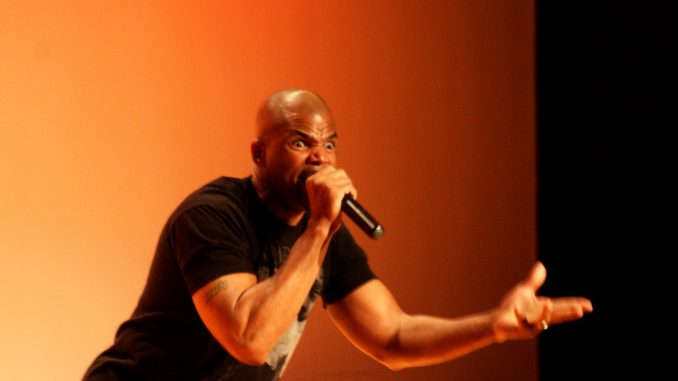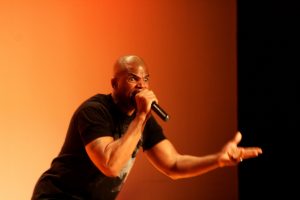
Alex Fredkin, Arts Editor
Image courtesy of Vincent Crabtree
When a hip-hop legend takes the stage, he is bound to command attention. Darryl McDaniels, the “DMC” of Run-DMC, was gracious enough to share his knowledge and perspective on the music industry with SUNY Oneonta students on Monday, Feb. 25. This event was put on by the Student Association Activities Council (SAAC). Before McDaniels’ speech he sat down with the State Times.
Run-DMC was one of the forefathers of hip-hop and laid the groundwork for hip-hop’s explosion in popularity during the early 90s. Run-DMC broke new ground for a movement that was still in its infancy. Some of its many firsts included being the first rap group on the cover of Rolling Stone, the first to sell a gold as well as platinum album, the first to appear on MTV and even the first to be signed to a sneaker endorsement deal (which was with Adidas). Run-DMC’s importance in the history of hip-hop is unprecedented, although McDaniels stays surprisingly humble.
“People think hip-hop started with Run-DMC, but it didn’t. Our significance is we were the ones to show [it to] the world,” said McDaniels.
McDaniels started off by explaining that what made hip-hop great during its formative years was its message, “These [rappers] were addressing social issues relative to their audience.” He cited tracks like Grandmaster Flash and the Furious Five’s “The Message,” or the Geto Boys’ “My Mind Playing Tricks on Me.” With a new art form speaking intelligently about issues such as a lack of education and second-rate housing in Reagan’s America, it grabbed people’s attention and urged them to take an interest in what hip-hop was doing.
Run-DMC captured the public’s interest in part because it was the first hip-hop group to represent the common people. McDaniels explained that “My experience growing up as a kid is no different than any other kids’, no matter where they live.” He spoke to the fact that all kids go through the same struggles such as bullying at school, problems with girls or tensions with parents. McDaniels was rapping about the world as he knew it.
“When we came along we didn’t change who we were as those young kids in the park going to school and playing basketball […] So when we came on T.V, whether it was a white kid in Wisconsin or a black kid in the ghetto, when they saw Run, D, and J, they saw themselves. That was our appeal, we weren’t celebrities.”
McDaniels parallels this mentality to that of some of the best-known rock artists, recalling that musicians such as Kurt Cobain, Bob Dylan and John Lennon didn’t dress up in elaborate costumes or flashy outfits. They simply got on stage and performed, letting their music portray the message. Run-DMC helped to bring that mentality to hip-hop.
McDaniels believes this essence of hip-hop and the urge to preach real messages is lost today. “When you think of hip-hop now […] the first thing the public thinks is drugs, guns, and sex.”
The music industry profited off of the rise and popularity of hip-hop during its golden era. This new focus on selling records and making money corrupted the true nature of hip-hop, according to McDaniels.
McDaniels emphatically laments “Now there’s such a big disconnect. When you see Jay-Z and Ludacris, you see celebrity.”
“I don’t want hip-hop to be like it was back in the day; I want it to be better than it was back in the day because it can be.”
He believes that rappers today put a higher priority on material possessions and fame than the music itself.
When asked who he likes in hip-hop today, McDaniels dismissed current rappers, saying he prefers to enjoy older music. “I’m stuck on Nirvana, Rage Against the Machine and classic rock.” He went on to mention other old artists such as Janis Joplin and Neil Young.
He believes hip-hop today is simple and unoriginal. He describes the situation in which artists strive to sound as close as they can to who is popular, instead of trying to stand out by being creative and different. This has produced a situation where there are far fewer artists in the top echelon. He recalls “Even though we was number one, LL [Cool J], Public Enemy, Eric B. [and Rakim] […] Salt-N-Pepa, everyone around us was great […] Right now you only have Kanye West and Jay-Z.”
During the golden age of hip-hop, all of these acts had to stand out and be different to get noticed in a genre that was exploding in popularity. Other greats of the time period included the Beastie Boys, A Tribe Called Quest, Nas, Wu-Tang Clan and N.W.A. These artists all can be considered amongst the best hip-hop groups of all time, and all were around within a short time period from around 1987 to 1994. This intense competition led to an unparalleled growth in creativity.
Run-DMC is not totally pessimistic though, and believes hip-hop can change and get back to that mentality. “I don’t want hip-hop to be like it was back in the day; I want it to be better than it was back in the day because it can be.”
He believes that artists need to stop being so one-dimensional and bring something new to the table. This starts with paying more attention to what is going on in the world and less attention with their possessions and how much money they have.
He put on a more serious tone and started talking about some of the violence that is going on today. McDaniels dramatically stood up, and enthusiastically proclaimed “America is praising the mentality that’s causing all that damage in Chicago, with all the shooting. If this was the generation of my young people, every rapper who was the most powerful figure in the music business would be making records every day about it […] I don’t need to hear about your jet and your money […] Your next record shouldn’t be about ‘living it up,’ it should be about ‘stop the killing'”
Hip-hop started from a very pure place of creativity and exploration. As it has gotten insanely popular and lucrative, contemporary hip-hop is almost foreign to the greats of the past. But McDaniels has been one of the integral figures of hip-hop since its birth, so if he thinks that hip-hop can be great again, then it can be.
Leave a Reply